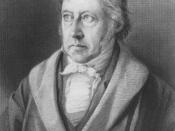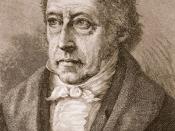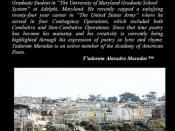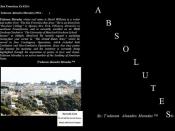On Hegel and Knowing For more than fourteen centuries, scholars staunchly believed that the sun revolved around the earth. This Ptolemaic conception dominated the sciences and was considered unshakable. It was not until a man named Copernicus proposed the notion of a heliocentric universe that things began to change. Eventually, science relented and accepted the idea of a heliocentric universe. Even today, when we hear ancient notions regarding a geocentric universe, we laugh in amazement. After all, how could people actually believe that the sun revolved around the earth? Who knows? Maybe in a few thousand years, future generations will look back on our beliefs and laugh too. Doesn't it seem somewhat arrogant and foolish that we believe our knowledge is correct? Aren't we in the same situation as classical civilizations? Don't we believe that we have discovered absolutely the way the universe works? The point is, what was once thought to be absolute knowledge has now become an amusing scientific joke.
Old knowledge has been supplanted by new knowledge, which is now considered absolute knowledge. How can we be sure that our knowledge is the truth? G.W.F. Hegel asked the same question in his dense and esoteric Phenomenology of Spirit. He wrote: "The road can therefore be regarded as the pathway of doubt, or more precisely as the way of despair. For what happens on it is not what is ordinarily understood when the word doubt is used: shilly-shallying about this or that presumed truth, followed by a return to that truth again, after the doubt has been appropriately dispelled "ÃÂ so that at the end of the process the matter is taken to be what it was in the first place"ÃÂ (pg. 49). This whole process is, according to Hegel, "certainty"ÃÂ or Absolute knowing. Hegel says that confusion and doubt are necessary in arriving at the truth. The question then becomes: how can someone have doubt or confusion about an object and still have an Absolute knowing of that object? Hegel's answer is that our consciousness or sense-certainty (Hegel's term) knowingly brings us through that process of doubt and helps us come closer to the truth of that object for us.
I disagree with Hegel's claim that Absolute knowing is connected to the entire thought process that leads us to certainty. I believe that the thought process is comprised of two elements: your consciousness and your ego. Your consciousness is the part of you that views things as they appear. Hegel said, ""æsense-certainty (consciousness) appears to be the truest knowledge; for it has not as yet omitted anything from the object, but has the object before it in its perfect entirety"à(pg. 53). Your ego, on the other hand, is "the division of the psyche that is conscious and most immediately controls thought and behavior"à(www.dictionary.com). The ego is what clouds your thought process and causes doubt and confusion.
I think that from the day a child is born, the parents and environment inculcate that child to view things in a certain way. This process shapes the future of the ego. For example, let us look at the mind of a hypothetic racist named Charley. Even before Charley could remember, his parents characterized a specific race with certain behaviors. For instance, the parents might instill in Charley's mind the belief that Asian Americans are the worst drivers ever. (I do not mean to be pejorative; I am simply creating an example.) From the first time Charley heard that remark, his ego had been conditioned to believe that statement to be true. From that point on, every time Charley sees an Asian American driving a car, Charley will look for an instance when he can "point his finger"ÃÂ and verify his claim. If he sees an instance when an Asian American is driving well, he will overlook that episode and still make a rash judgment that they are all bad drivers.
Another example of the ego clouding the thought process is the story of Jesus. Christians believe that Jesus gave His life to save us and when we die, He will save us yet again by bringing us into Heaven. Christians believe that the world in which we live is a torment and we should await death so that we may achieve eternal life in Heaven. But we still use medicine and technology in an attempt to prolong our life and torment in this world. Why do we doubt our ultimate salvation? The consciousness of Christians believes in Jesus and His saving grace, but their egos might force some of them to prolong life for various reasons. Someone might want to earn one million dollars before death. Another person might want to gain as much knowledge as humanly possible before their time is "up."ÃÂ Whatever the reason behind their desire for self-preservation, it is because of their conditioned egos. Their egos cloud consciousness generating the doubt and confusion.
Another argument against Hegel's belief of Absolute knowing is the pure intuition of time. Time is hardly a consideration to Hegel when discussing the Absolute knowing of an object. For a hypothetical example, there is a woman named Mary. When I met Mary for the first time, I experienced her being a nice, caring individual. Let's call this point A. I then made a judgment, through the use of my ego, saying that Mary was "a stand-up gal"ÃÂ(point B). I held this conception of Mary in my head until one day when I experienced her contradicting my original impression. This is the point of confusion and doubt (point C). This experience led me to re-conceptualize my conceptions (point D).
Hegel believes that all four points are involved in the procedure of the Absolute knowing of Mary. I think that one could split up this process into three parts that all have different Absolute knowings of Mary. Let's say that on Monday, I experienced Mary for the first time and made a conception of her (point A and B). That day, I had one Absolute knowing of Mary being a kind and caring person. Then, lets say that on Thursday, I see her verbally abusing someone. I then ask myself, "Who is Mary"ÃÂ (point C)? My second Absolute knowing of Mary is that I don't know Mary. Then I reevaluate and alter my conceptions. The third Absolute knowing of Mary is that of a mean-spirited person (point D). All three parts happened at different times and each had a different Absolute knowing of Mary to me.
One could propose a counterargument contradicting the idea of time with an Absolute knowing of an object. If one were to say that there were in fact three Absolute knowings of Mary, as in the above case, then the question proposed is: "if there was an Absolute knowing of Mary, how could it change?"ÃÂ How can something be an Absolute if it constantly changes? Also, one could ask, what is the final Absolute knowing of Mary (the Absolute knowledge)? These questions support the idea that the whole process of interpreting Mary is only one Absolute knowing of Mary.
If anything can be gleaned from Hegel's protracted discourse, it is Hegel's outstanding contribution to epistemology. His dialectic concerning Absolute knowing provided an optimistic yet simultaneously historical approach to the discipline. Because of Hegel, the quest for truth became an ongoing synthesis of ideas. Old ideas were not rejected or dismissed; they were incorporated into a newer, more innovative belief. This never-ending process allowed for the melding of ideas and the eventual arrival at Absolute knowledge. We may believe that the universe is heliocentric now, but the Hegelian dialectic teaches us that we should never ignore our curiosity.





